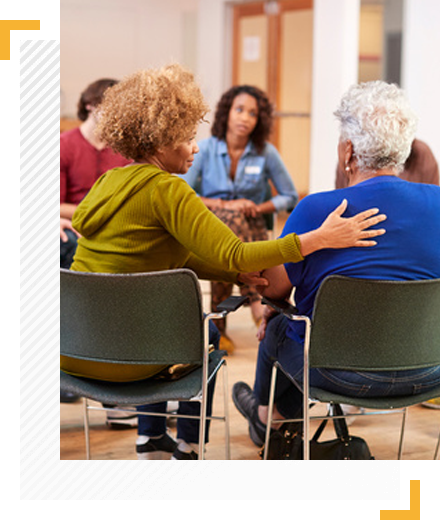Adult Rehabilitative Mental Health Services (ARMHS)
Our services are ideal for individuals aged 18 years old and older experiencing serious forms of mental illness(es).

Basic living and social skills
Basic living and social skills are activities that instruct, assist and support a member in skill areas essential for everyday, independent living. Basic living and social skills are provided directly (face-to-face) to the member.
Examples of skill areas include the following:
- Community resource utilization and integration
- Crisis assistance
- Relapse prevention
- Budgeting, shopping, and healthy lifestyle skills and practices
- Cooking and nutrition
- Transportation
- Medication monitoring
- Mental illness symptom management
Certified Peer Specialist Services
- Non-clinical, recovery-focused activities encouraging empowerment, self-determination, and decision-making, which are only provided by a CPS
- Activities that can address and contribute to the ARMHS team insights about feelings associated with stigma, social isolation, personal loss, systemic power dynamics and restoring one’s lifestyle following hospitalization, or other acute care services
Refer to the Certified Peer Specialist Services for more information.


Community intervention
Community intervention is a service of strategies provided on behalf of a member to do the following:
- Alleviate or reduce a member’s barriers to community integration or independent living
- Minimize the risk of hospitalization or placement in a more restrictive living arrangement
Community intervention may be conducted with an agency, institution, employer, landlord, or member’s family and may require the involvement of the member’s relatives, guardians, friends, employer, landlord, treatment providers, or other significant people to change situations and allow the member to function more independently.
Functional Assessments
A comprehensive FA is a narrative that describes how the person’s mental health symptoms impact their day-to-day functioning in a variety of roles and settings. It is important to look at how factors other than mental health symptoms impact life functioning.
Refer to Functional Assessments for complete information.
LOCUS
Assessment of functional ability informs the level of care utilization system (LOCUS) assessment, which determines the service intensity needs of the individual. Refer to the LOCUS section for more information.
Interpretive Summary The interpretive summary is used to synthesize the information obtained from the three-tier assessment process (diagnostic, functional, and LOCUS) to prioritize direction for the upcoming individual treatment plan. It is an essential bridge or link from assessment to service planning.
An interpretive summary does the following:
• Identifies what outcomes the person desires relative to his or her life circumstances and preferences
- Describes how the mental health symptoms are affecting the person’s and his or her family’s life
- Summarizes the nature of the functional barriers as they relate to symptoms of the mental illness to establish the priorities for the next treatment plan
- Examines the person’s strengths, abilities, and resources
- Examines how the person’s strengths, abilities, and resources can be engaged to improve functioning and move forward on identified desirable recovery outcomes
- Establishes the priorities for the initial and subsequent individual treatment plan
- Recommends services and interventions
The mental health clinical supervisor or mental health practitioners under the supervision of the mental health professional clinical supervisor must complete the interpretive summary. The mental health professional and mental health practitioner must sign the interpretive summary.


Individual treatment plan
An individual treatment plan (ITP) is a written plan that documents the treatment strategy, the schedule for accomplishing the goals and objectives, and the responsible party for each treatment component. Complete an individual treatment plan before mental health service delivery begins.
An ITP of any ARMHS is based on a diagnostic and functional assessment, documents the plan of care, and guides treatment interventions. Development of the ITP includes the involvement of the client, client’s family, caregivers, or other people, which may include people authorized to consent to mental health services for the client and includes an arrangement of treatment and support activities consistent with the client’s cultural and linguistic needs.
The ITP focuses on the person’s vision of recovery, his or her priority treatment goals and objectives, and the interventions that will help meet those goals and objectives. The plan must be written in a way in which the person and his or her family have a clear understanding of the services being offered and specifically how the services will address their concerns. The person must take part in the process of developing the ITP to make sure the treatment is relevant to the priorities and incorporates his or her strengths.
Medication education
The medication education service educates a member about the following:
- Mental illness and symptoms
- The role and effects of medications in treating symptoms of mental illness
- The side effects of medications


Transition to community living (TCL) services
Transition to community living (TCL) services are developed for the following purposes:
- To establish or re-establish contact between an ARMHS provider and the member before the member’s discharge from a higher level of care mental health service
- To implement the discharge plan developed by the higher level of care mental health service.

